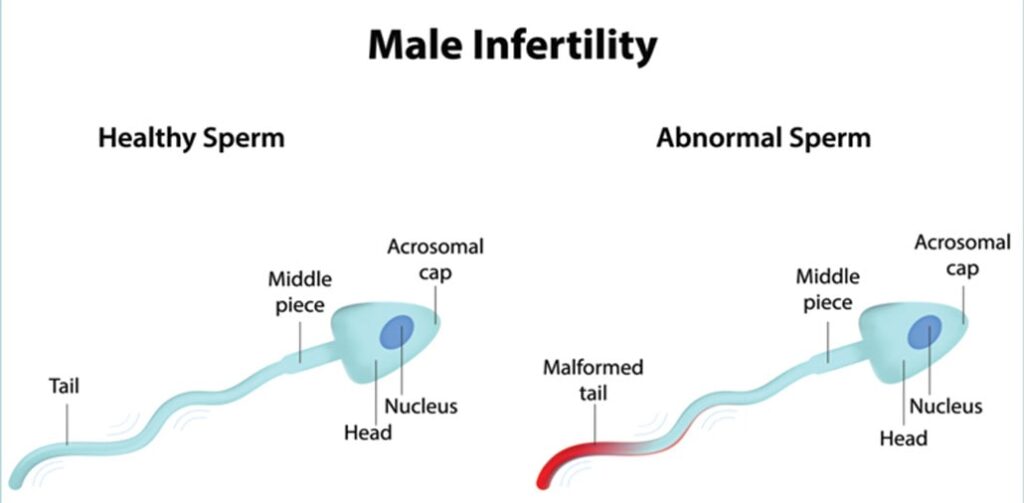
Diagnosis
Many infertile couples have more than one cause of infertility, so it’s likely you will both need to see a doctor. It might take a number of tests to determine the cause of infertility. In some cases, a cause is never identified.Infertility tests can be expensive and might not be covered by insurance — find out what your medical plan covers ahead of time.
Male Infertility Treatment: A Comprehensive Guide
Male infertility is a common issue that can significantly affect a couple’s ability to conceive. It can result from a variety of factors, including low sperm count, poor sperm motility (movement), abnormal sperm shape (morphology), or blockages in the reproductive tract. Fortunately, advancements in medical science have led to several effective treatments for male infertility. If you and your partner are struggling to conceive, understanding the treatment options available for male infertility can help you make informed decisions on how to proceed.
Causes of Male Infertility
Male infertility can stem from several underlying issues, including:
- Low Sperm Count (Oligospermia): A lower than normal number of sperm in the ejaculate can reduce the chances of fertilizing an egg.
- Poor Sperm Motility (Asthenozoospermia): Even if there are enough sperm, poor motility (movement) can prevent sperm from reaching and fertilizing the egg.
- Abnormal Sperm Morphology (Teratozoospermia): Sperm that have an irregular shape may have difficulty penetrating the egg.
- Varicocele: Swelling of veins around the testicles, leading to reduced sperm production and quality.
- Ejaculation Disorders: Conditions like retrograde ejaculation, where sperm enters the bladder instead of exiting through the penis, can lead to infertility.
- Blockages or Obstructions: Blockages in the male reproductive system (e.g., vas deferens) can prevent sperm from being released during ejaculation.
- Hormonal Imbalances: Hormonal disorders such as low testosterone or issues with the pituitary gland can impact sperm production.
- Genetic Disorders: Conditions like Klinefelter syndrome, cystic fibrosis, or Y-chromosome microdeletions can affect fertility.
- Lifestyle Factors: Smoking, excessive alcohol use, drug use, obesity, and environmental toxins can impair sperm production and quality.
- Age: While female fertility declines with age, male fertility can also decline, especially after the age of 40.
Treatment Options for Male Infertility
There are several treatment options available to address male infertility, depending on the cause of the issue.
1. Lifestyle Modifications
Sometimes, making changes in lifestyle can help improve sperm health:
- Quit Smoking: Smoking can negatively impact sperm quality and motility.
- Limit Alcohol and Drug Use: Reducing alcohol intake and avoiding recreational drugs can improve fertility.
- Lose Excess Weight: Obesity can lead to lower testosterone levels and lower sperm count.
- Eat a Healthy Diet: A balanced diet rich in antioxidants, vitamins, and minerals can help improve sperm quality.
- Exercise: Regular, moderate exercise helps improve overall health and reproductive function.
- Avoid Environmental Toxins: Minimize exposure to chemicals, pesticides, and heavy metals that can harm sperm.
2. Medical Treatments for Hormonal Imbalances
If male infertility is caused by hormonal issues, medications may help:
- Clomiphene Citrate: Often used in women, this drug can also be used in men to increase testosterone levels and improve sperm production.
- Gonadotropins: These are hormones used to stimulate sperm production in men with low testosterone or hormonal imbalances.
- Human Chorionic Gonadotropin (hCG): Sometimes used to treat low sperm count by stimulating the testes to produce more sperm.
3. Surgical Treatment
In cases where structural issues or blockages are present, surgery may be required to improve fertility:
- Varicocele Repair: If a varicocele (swollen veins in the scrotum) is causing infertility, surgery can be performed to correct the condition and improve sperm production.
- Vasectomy Reversal: If male infertility is due to a prior vasectomy, a vasectomy reversal surgery can reconnect the vas deferens, allowing sperm to be present in the ejaculate again.
- Sperm Retrieval: In cases of obstructive azoospermia (blockage preventing sperm from being released), sperm can be retrieved directly from the testes or epididymis via procedures like Testicular Sperm Aspiration (TESA) or Percutaneous Epididymal Sperm Aspiration (PESA).
4. Assisted Reproductive Techniques (ART)
In cases where lifestyle changes or medical treatments do not resolve male infertility, assisted reproductive technologies (ART) may be necessary.
- Intrauterine Insemination (IUI): This is a less invasive fertility treatment where sperm is washed and concentrated before being injected directly into the uterus during ovulation. IUI is often used when sperm quality is suboptimal but not severely compromised.
- In Vitro Fertilization (IVF): In IVF, sperm is used to fertilize an egg outside the body, and the resulting embryo is implanted into the woman’s uterus. IVF is typically used when there are significant male infertility factors, such as low sperm count or poor sperm motility.
- Intracytoplasmic Sperm Injection (ICSI): This is a technique used during IVF where a single sperm is injected directly into an egg. ICSI is commonly used in cases of male infertility with severe sperm quality issues, such as low motility or poor morphology.
- Sperm Donation: In cases where male infertility cannot be addressed through treatment, sperm donation may be an option. Donor sperm can be used in IUI or IVF treatments to enable conception.
5. Antioxidant Therapy
Certain vitamins and supplements, like Coenzyme Q10, Vitamin C, and Vitamin E, are believed to help improve sperm quality by reducing oxidative stress. These antioxidants may help protect sperm from damage caused by free radicals.
6. Acupuncture
Some studies suggest that acupuncture may improve sperm quality by increasing blood flow to the testes and balancing reproductive hormones. Though more research is needed, acupuncture is sometimes used as a complementary therapy for male infertility.
When to Seek Treatment
If you and your partner have been trying to conceive for over a year without success, it may be time to consult a fertility specialist. A male fertility evaluation typically includes a semen analysis to assess sperm count, motility, and morphology. Based on the results, the doctor will determine the most appropriate treatment options.
Conclusion
Male infertility is a multifaceted condition that can be caused by a range of factors, but with advancements in medical technology and fertility treatments, many couples with male infertility can successfully achieve pregnancy. If you’re facing challenges with fertility, consult with a fertility specialist to determine the cause of the issue and explore the best treatment options. Whether through lifestyle changes, medical treatments, surgical interventions, or assisted reproductive technologies like IVF or ICSI, there are many paths to parenthood even in the face of male infertility.


